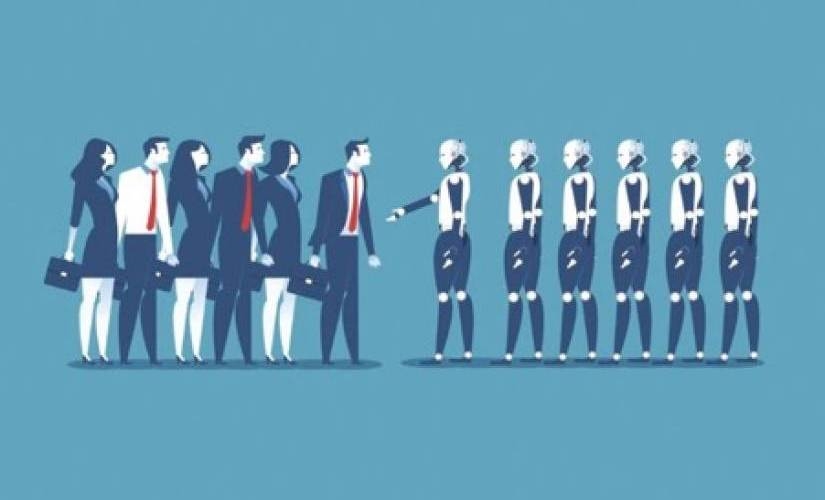Is AI Really a Threat to Traditional Jobs?

Artificial Intelligence (AI) has become one of the most popular buzzwords in the IT industry today. It’s boosted the confidence of tech pundits but also instilled fear in the hearts of the salaried professionals and small business owners. Some businesses believe that AI technology is coming after their jobs and companies. However, what’s the ground reality, really?
Is the Hype Real for AI to Take Jobs?
Whether you are in favor of the widespread implementation of AI or not, the technology is here to say. It’s matured considerably over the past few years, and new-age solutions are already being devised and implemented across various industries.
A good example, of course, is chatbots that can drastically improve customer experience by processing a large number of queries with impressive efficiency, providing availability 24/7 (something highly challenging to achieve with traditional customer support executives).
The thought is that this type of AI will bring down business costs (cheaper to implement than hiring full-time employees). Another excellent example of AI in the present era is driverless cars.
Let’s face it — automated cars are closer to reality than ever, and they will eventually eliminate the need for human-crewed automobiles. Related projects are also underway across the world as Google, Tesla, and other giants are conducting experiments and assessing the performance of their designs for full-fledged implementation.
The Impact of AI on Traditional Jobs.
The two examples of AI that we discussed above shed light on AI’s potential. However, they also paint a dark picture, i.e., a world where traditional jobs could be lost to software programs. Driverless cars, artificial virtual assistances? Can these exist? The answer, unfortunately, is “yes.” However, does it mean that we should be worried about jobs already? Maybe not.
Despite all kinds of news floating around on the Internet, spreading fear and hate for AI, the technology isn’t really something to be afraid of. We will indeed see more of it in various kinds of jobs, but the element of “human touch” won’t disappear all of a sudden, at least for quite some time.
For instance, there is still a need for branding experts who can study different organizations and propose the perfect styling guides for their websites and social media pages, or digital marketing agencies that can help you pitch your startup to publications.
More Jobs, Maybe?
What many experts have pointed out about the impact of AI on jobs, is that rather than destroying livelihoods, it will promote them. An excellent example to understand its effects is the ATM. It looks like the kind of technology that can take the jobs of humans.
However, the reality is that there are more tellers at the banks now than when the machines were released. But why? The answer is easy- when ATMs were launched, they helped the banks to lower their operational costs drastically. The ATM allowed the banks to use their funds to hire more tellers.
If you carefully assess the ATM example, it won’t be hard for you to imagine a future where robots and humans co-exist and work in perfect harmony. Here is what it could look like:
- AI programs and robots dealing with laborious and automated tasks
- Humans focusing on creative jobs.
- AI translating one language to another.but we will need.
- Human translators when someone needs to do business with an entity located overseas.
According to a forecast by the Bureau of Labor Statistics, there are many occupations where AI will accelerate job growth rather than limit it. These include web developers, medical secretaries, geological technicians, accountants, etc.
AI-Proof Jobs?
The following qualities will be in massive demand for the jobs of the future: emotional intelligence, creativity, and STEM education, which comprises Science, Technology, Engineering, and Mathematics. So, if you are building these skills, then you are suitable for the most part.
The world might be divided on whether AI will really hurt or promote job growth. If one wants to be on the safe side, just in case, then certain high-paying jobs are believed can survive the robot generation.
If you are still building a career, then the following are some options that you can consider: university professors, computer systems analysts, physicians and dentists, therapists, etc. Even as futurists and work culture experts have tried to give a rest to the concerns of salaried professionals, fear of robots and AI continues to exist.
This fear isn’t entirely irrational, though. After all, we all have seen at least a few sci-fi movies in which robots take over the world. However, we are far from that kind of advanced society. As long as the employed workers are developing skills that are unfit for AI (emotional intelligence and creativity, for instance), all will be well.
I don’t think we will have an issue of AI taking over everything, but you should always stay protected from the worst of times. As AI can reduce business costs, we can also see a growth in jobs with which humans can add value to organizations.
The post Is AI Really a Threat to Traditional Jobs? appeared first on ReadWrite.
(33)